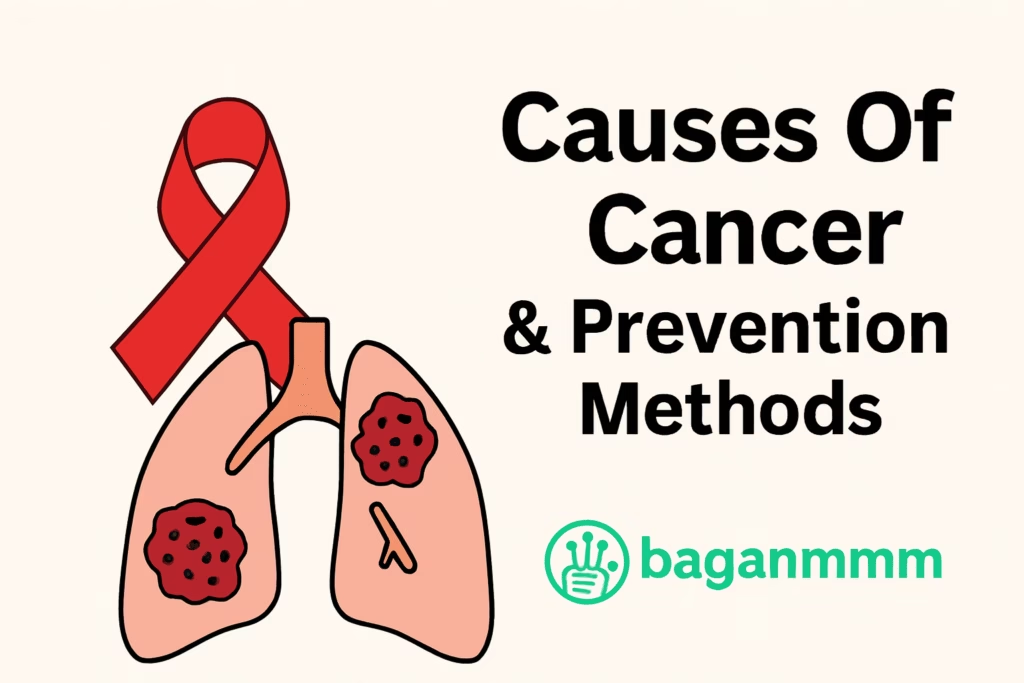Causes of Cancer and Prevention Methods

This content is for educational purposes only and does not provide medical advice. Please consult a qualified healthcare professional for personal guidance.
Cancer is a nightmare for everyone. If one person in a family suffers from cancer, the whole family experiences distress. Therefore, I will share some points about cancer that should be prevented in advance. This information is based on carcinogenic consumer products announced by the American Cancer Prevention Association. It is explained so that people can avoid using these products.
1. Harmful substances
such as formaldehyde, nitrobenzene, and methylene chloride, which cause cancer, are contained in commonly used consumer products such as rubber, plastics, dyes, perfumes, cosmetics, body lotions, and shampoos. The more these are used daily, the higher the chance of cancer. Therefore, only by reducing exposure to such carcinogenic chemicals can we protect the health of ourselves and our families.
2. Air fresheners:
Most air freshener sprays contain volatile carcinogenic chemicals. It is best not to use them if possible. Keeping the room well‑lit and ventilated, opening windows, and using fans can keep the room fresh without using air fresheners.
3. Cosmetics and personal care products:
Daily use of the following products, especially by people who want to look beautiful, increases exposure to carcinogens.
3.(1) Cosmetics such as powders and foundations contain BHA and talc, which are carcinogens. Talc can cause lung irritation. Baby powders containing talc have been linked to ovarian cancer later in life. TEA (Triethanolamine) can react with nitrites to form carcinogenic nitrosamines. Lanolin may be contaminated with DDT and other pesticides. Parabens, a petroleum‑based chemical, can cause skin irritation. Fragrances can also irritate the skin. Therefore, except for special occasions, it is best not to use makeup daily. If used, it should be removed immediately afterward.
3.(2) Toothpastes containing saccharin, FD & Blue dyes, and fluoride have been linked to cancer.
3.(3) Hair conditioners such as VO5 (Essence of Neutral Henna) contain formaldehyde compounds that cause cancer, nerve toxicity, and skin irritation. Polysorbate 80, FD & Red 4, and fragrances are also carcinogens. Instead of using such shampoos, traditional natural cleansers like soapnut fruit should be used.
3.(4) Hair dyes: Not only older people but also young people use various hair dyes. These contain carcinogens such as Quaternium‑15 and formaldehyde releasers, which also cause allergies and nerve toxicity. DEA (Diethanolamine) can form carcinogenic nitrosamines. Phenylenediamine causes cancer and skin irritation. Propylene glycol and fragrances also irritate the skin. Evidence shows that hair dye use is linked to cancers such as NHL (Non‑Hodgkin’s Lymphoma) and multiple myeloma. Therefore, it is better to keep hair natural rather than risk cancer for beauty.
4. Household products: Some personal care products contain crystalline silica, a carcinogen that harms the eyes, skin, and lungs. Heavy‑duty cleansers also contain crystalline silica. Using plain soap and water is safer.
5. Lysol disinfectant sprays contain Orthophenylphenol (OPP), which can cause cancer and allergic reactions.
6. Flea and tick collars for cats and dogs contain Propoxur, a carcinogenic and neurotoxic chemical. If exposed, wash immediately.
7. Weed killers containing sodium dichlorophenoxyacetate are carcinogenic and can cause lymphoma, sarcoma, and other cancers, as well as damage to the nervous and reproductive systems.
8. Beef franks contain benzene hexachloride and dacthal, which are carcinogens and can also cause allergies. DDT and dieldrin are carcinogenic and act as animal estrogens. Hormones used in livestock can also increase cancer risk. Preservatives such as sodium nitrites can react with amines in meat to form carcinogenic nitrosamines.
9. Whole milk: DDT, dieldrin, and hexachlorobenzene found in milk are carcinogenic and toxic to the nervous and reproductive systems. Antibiotics and growth hormones in milk have been linked to breast, colon, and prostate cancers.
10. Laundry detergents: Many detergents contain toxic chemicals. If not rinsed properly, residues can be absorbed through the skin or inhaled. These chemicals can damage the lungs, reproductive organs, heart, blood vessels, kidneys, and nervous system.
From these points, we see that daily use of household products increases the risk of cancer and allergies. Many consumer products do not carry warnings about carcinogens. Food labels may mention cholesterol but not carcinogens. Cosmetics and pesticides also often omit such warnings. Scientists have identified these risks through careful research.
Worldwide, cancer rates are rising rapidly. Currently, one in three people will develop cancer during their lifetime, and one in four will die from it. Many cancers can be reduced if we avoid the household products, cosmetics, and foods mentioned above. By carefully choosing natural products, we can reduce the risk of cancer.
This information is based on a blog written by Dr. Aye Myat Chay. Since medical terminology is included, it may be difficult for the audience to fully understand.
In conclusion
If we reduce the use of daily consumer products and processed foods as much as possible and replace them with natural alternatives, we can help protect ourselves and our families from cancer.
Alice is the visionary behind Baganmmm Tech, a platform he founded with a passion for demystifying the complex world of technology. As the Lead Technologist, he's often found in his home lab – a cozy, wire-filled sanctuary where ideas are born and code is meticulously crafted. His infectious enthusiasm and knack for explaining intricate concepts make him the go-to expert for everything from web development to emerging tech trends.
